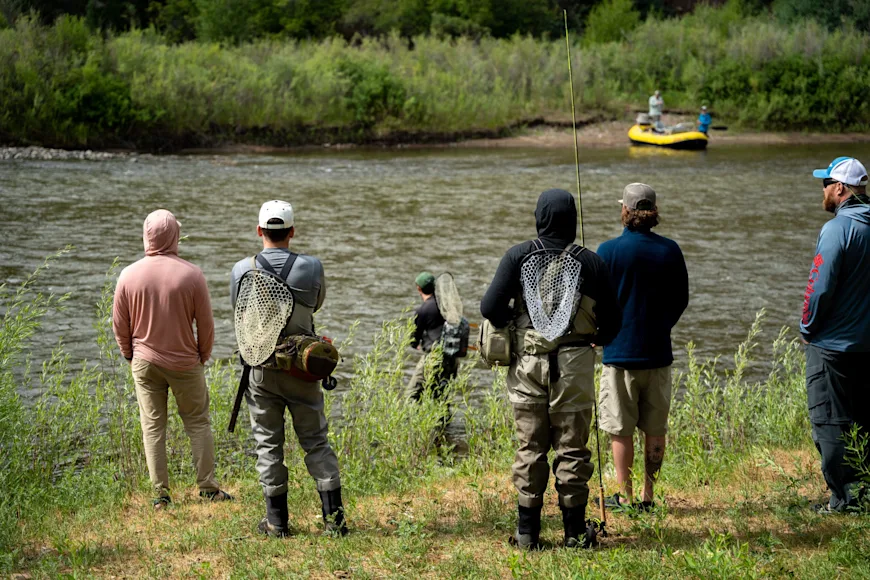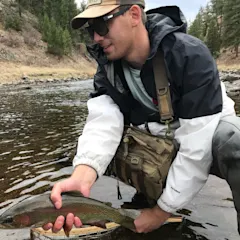When I first meet Todd, he tells me how stoked he is about catching his first fish on a fly rod. An Air Force veteran who currently works for a federal law enforcement agency, Todd is a big dude with a full beard. He says the fish he caught was small, and when he shows me a photo of his catch, I’m almost surprised the fish didn’t slip through the webbing of his oversized net. None of this seems to matter to Todd, though, whose smile is wider than the brown trout is long.
“Everyone cheered for me,” he says. “Up and down the river. If it wasn’t for how big the net was, it would’ve looked way bigger.”
We’re on a pristine section of private water in the middle section of the Colorado River at a fishing retreat hosted by Fishing the Good Fight,
a Denver nonprofit founded in November 2019. The organization uses fly fishing to support men struggling with their mental health. Having never heard of a program like this, I was curious to learn more. I contacted founder Jennings Hester, and he invited me to visit on the second day of a weekend retreat in June the group was hosting. The retreat involves a licensed counselor leading group therapy sessions and a team of volunteers (some of whom attended a previous retreat in April 2021) serving as pseudo-fishing guides for six participants who have a range of backgrounds, ages, professions, and fly-fishing-competency levels.
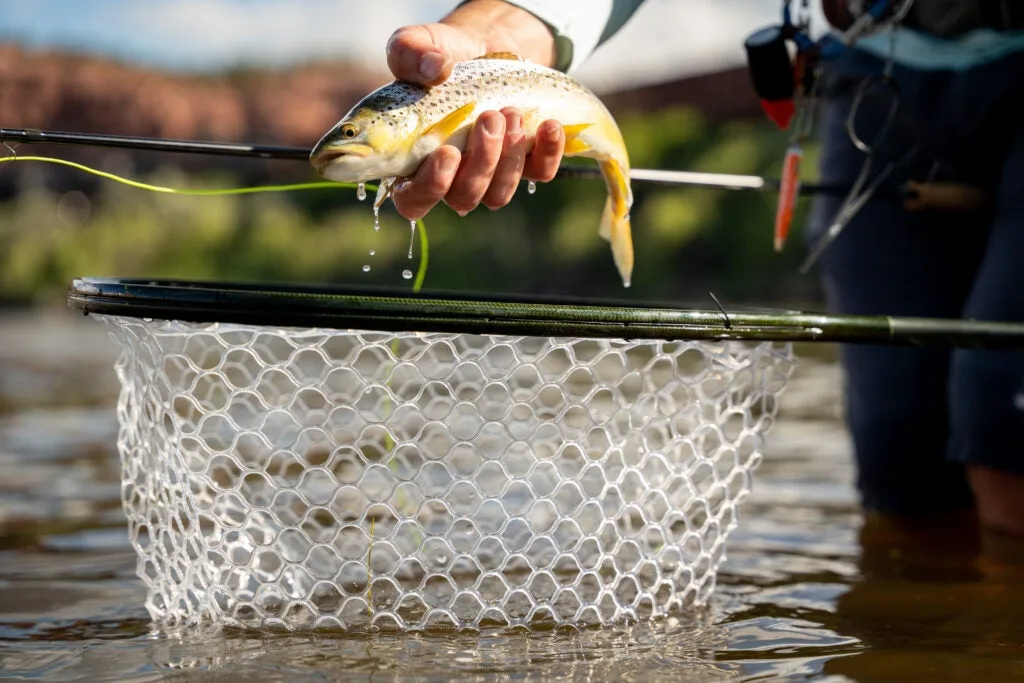
An angler releases a small brown trout. Bradey Hall
Talking Through the Pain
Todd tells me the weekend has been exactly what he needed. For years, he’d been searching for mental health support, primarily for PTSD
. He’d also always wanted to learn how to fly fish. With this retreat, he could do both. He’d sought treatment years ago when he returned from his sixth deployment to Afghanistan, but he struggled to connect with any therapists.
“I went to some counseling, but no one understands,” he says. “You’re going in, feeling like another number, and you’ve got to explain your military experience—what you dealt with. After my third or fourth session, it was zero gain. I was probably more frustrated than when I started.”
He begins to give me a sense of what he dealt with. He says the daily grind of preparing for deployment gave him purpose—but that he dreaded leaving his family when the time eventually came. In Afghanistan, as the base he lived on was getting mortared, he’d worry about his wife and kids back home. Not being there for them made him feel powerless, and he worried that he might not make it back to them. And while he loved working alongside his close friends, the threat of losing them, too, constantly loomed.
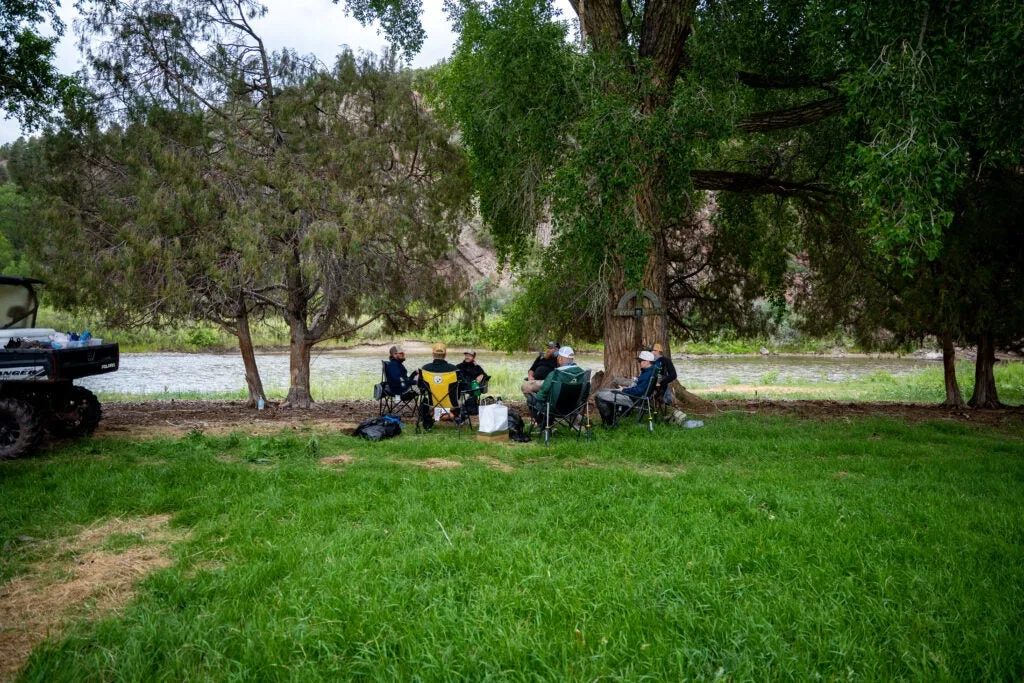
The men participated in daily group therapy sessions next to the river. Bradey Hall
“My unit on my last deployment was combat search and rescue,” he says. “We were multinational. We would pick up the Taliban for prisoner transport or for medical aid. We would also pick up the girl that was riding on her dad’s motorcycle on a dirt road in the back hills of Afghanistan who gets in an automobile accident. So, she’s in the back of the helicopter bleeding out, and she doesn’t make it. And then you have the soldier that doesn’t make it—”
Todd stops there and takes a few breaths. Some of his worst memories are moments when his unit was unable to rescue American troops. His unit used a helicopter to perform rescues, but sometimes the higher-ups wouldn’t let them launch it because of weather, risk assessments, or simply because the clock had already run out.
“You get fired up,” he says. “You want to help them, and you can’t.” Tears fall down his face before he wipes them away. It’s obvious that talking about these memories is difficult—but then talking about them is what this weekend is all about.
“People listened to me here,” he says. “You start finding that you’re not alone. That’s just huge. I thought I was being brave by not talking about it. That’s kind of the funny thing: You put this shield of armor on and approach things as if you’re indestructible. I just can’t do that anymore. I was driving myself into an early grave. It doesn’t do my wife any good. It doesn’t do my kids any good. I want to get there for natural causes, not because I didn’t talk to someone about it.”
Tying Flies to Save Lives
Saturday morning at the retreat, Jennings Hester, the founder of Fishing the Good Fight, is flipping rocks to collect bugs for an educational session on entomology. The floor of the Colorado River, which is known for its 16- to 20-inch browns, holds a veritable trout buffet. Almost every rock we turn is crawling with cased caddis and stonefly larvae. A big adult salmonfly flits across the surface, a straggler from the main hatch that occurred a few weeks earlier.
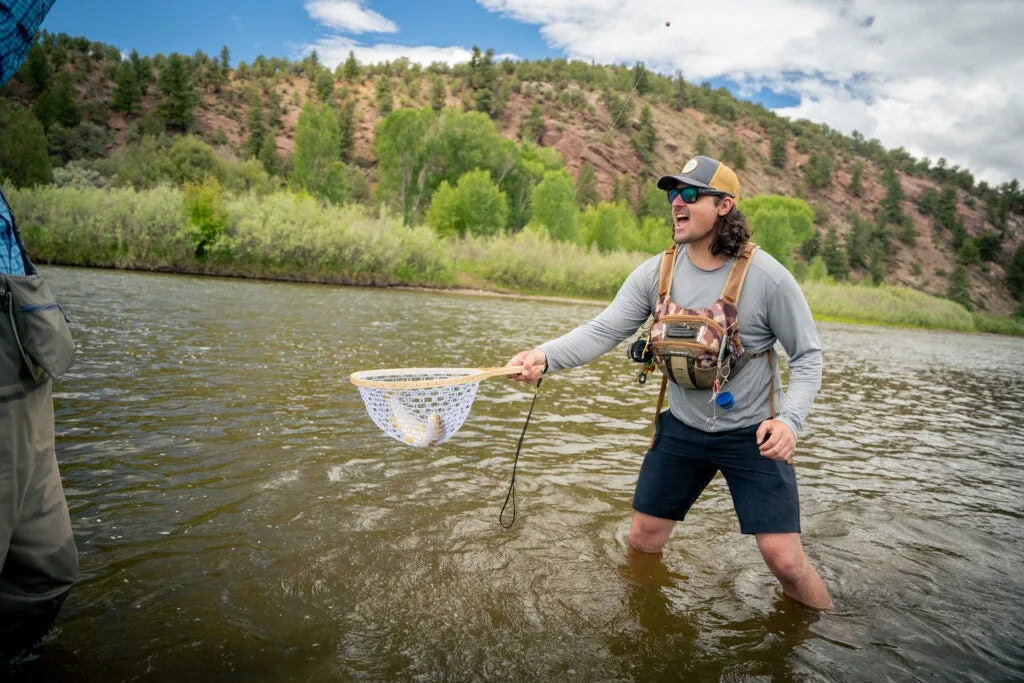
Jennings Hester, who founded Fishing the Good Fight, helps another angler with the net. Bradey Hall
Jennings, a former inside linebacker at the perennial powerhouse of Alabama, is another big dude. He’s also a serious fly angler and tier—but for someone who started a fishing-based organization, he’s relatively new to the game. He grew up in Georgia and did some spin fishing in his childhood, but he’s only been fly fishing for the past four years. Of course, his decision to start Fishing the Good Fight was about more than just fishing.
“I started dealing with really severe depression and anxiety near the end of high school,” he says. “Like many men, I didn’t realize that I had an illness that could be treated. I just thought that it was how people felt—suicidal thoughts, negativity, depression. I didn’t think it was anything strange.”
His symptoms worsened after he suffered a career-ending injury during his third year of college. Football had been his focus, and without it, he spiraled. Clinical depression is different for everybody, but Jennings had several common symptoms. He couldn’t think clearly, couldn’t sleep, and lost weight. He managed to graduate from college but lost one of his first jobs afterward because of intense social anxiety. Eventually, his family “basically dragged” him to get help. He saw a therapist and started taking anti-depressants, despite incurring significant credit-card debt in the process. Slowly, he started feeling better, especially when he was able to spend time outside with his German Shepherd, Kolt. In fact, he was taking so much solace in exploring Georgia’s backcountry with his dog that he decided to move out to Denver to be near the Rocky Mountains. That’s when he got serious about fly fishing.
“You have to be focused on every little detail when you’re fly fishing,” he says. “If you take a second off, you’re losing a fish. You can’t be thinking about stressors—and if you are, you’re not going to catch fish.”
Jennings worked from home but craved social interaction, so he started tying flies at Zuni Street Brewing Company in the evenings. He got so good at it that other anglers noticed his work and started asking to buy his flies. He’d been wanting to give back to organizations that focus on mental health, so he decided to donate the proceeds of the flies he sold to groups like Man Therapy
and People House
.
Jennings had been keeping his efforts informal, but as his donations grew, a lawyer friend decided to incorporate Fishing the Good Fight as a nonprofit as a sort of gift. It was the push Jennings needed to take his efforts more seriously. He started using volunteer fly tiers to sell more flies and directed proceeds toward fishing-themed marketing campaigns to raise awareness about men’s mental health and provide resources for those struggling. He also started a scholarship program to give funds directly to men to support mental health treatment, which is often prohibitively expensive for the people who need it.
Already in its first two years, Fishing the Good Fight has put more than $20,000 into its programming and funded more than 100 therapy sessions. It also funded the spots of two “scholarship” participants at the weekend retreat. The organization still raises money through fly sales, but they also rely on memberships and donations. Jennings recently hired the group’s first full-time staffer, COO Joe Dietz. While fishing is central to the project’s mission, Jennings is adamant that for some men, it should only be one part of the equation.
“If [fly fishing] turns into a crutch, and you’re not seeking help in your everyday life, it’s never really going to get better,” he says. According to the CDC
, men are almost four times more likely to take their lives than women, though they’re far less likely to seek treatment. “Men act out,” Jennings adds. “We drink. We do drugs. We take our own lives.”
Therapy in the Wild
Harrison Brodwin, a licensed professional counselor from Elevated Counseling and Wellness
, leads the mental health side of the retreat. He treats men in his private practice and notes three main themes that come up often: father-son relationships, keeping a feeling of control in your life, and grief.
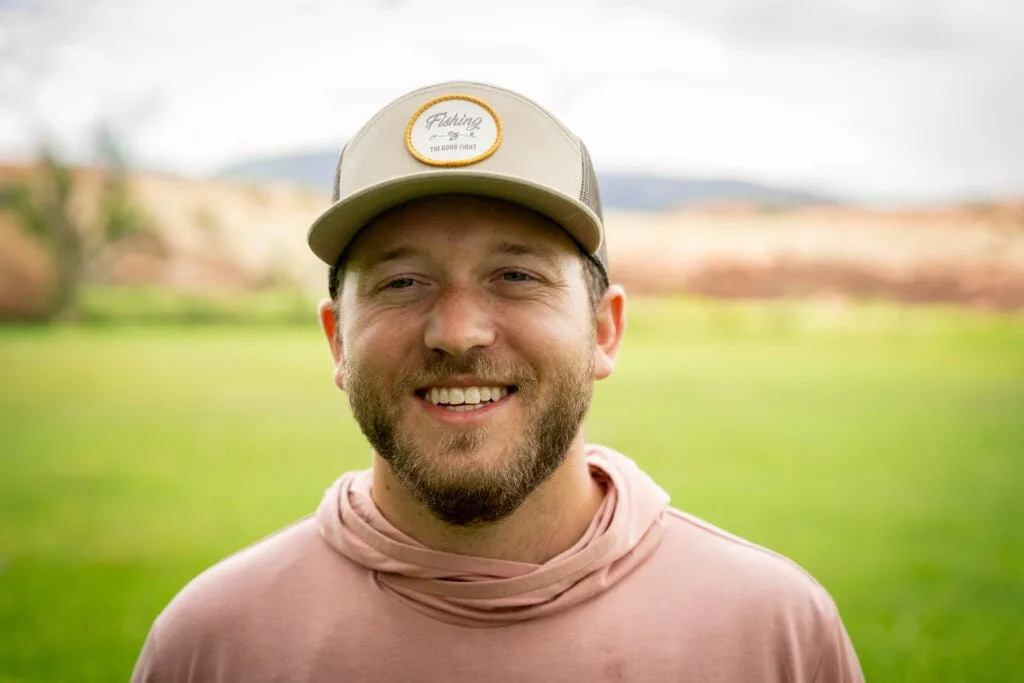
Harrison Brodwin is a licensed counselor. Bradey Hall
Harrison says therapy isn’t for everyone—but for those open to it, he thinks it can help. Harrison struggled with severe ADHD, substance abuse, and anxiety when he was young. His parents shipped him off to the Boundary Waters of Minnesota on an Outward Bound
trip. The wilderness experience, while extremely challenging, resonated with him. And even though the term “wilderness therapy” has become a bit of a buzzword in recent years, Harrison believes the spaciousness and tranquility of outdoor spaces allow for moments of healing and growth. Harrison also talks about how the total focus required when you’re on the water translates to group therapy.
“All the noise will naturally mute,” he says. “In many ways, we’re doing something similar in our counseling circles in that we’re creating a space for guys to simply be present to their emotional experience in the moment.”
“As men, we often see each other as competition—kill or be killed—and that often leaves us on an island. What we see here is that when we’re able to come together, although it takes a tremendous amount of courage and vulnerability, all the walls come down, and we know we’re not alone.”
Catch of a Lifetime
I spend a good chunk of the day fishing with Dave, who describes himself as a “pretty ordinary person.” An experienced outdoorsman, Dave grew up on a 40-acre farm in rural Pennsylvania before going to college in West Virginia, where he got serious about bowhunting. Now, he’s a banking executive and a little league coach—which means he doesn’t get to hunt or fish as much as he’d like. He rues the fact that an Alberta bear hunt he’d had planned got canceled because of the COVID-19 pandemic.
Dave’s no stranger to mental healthcare, either. He spent the last five years in therapy. He came to the retreat at the recommendation of a friend, who’d participated in the first retreat. He said he was excited to fish but not quite sure what he’d get out of the experience.
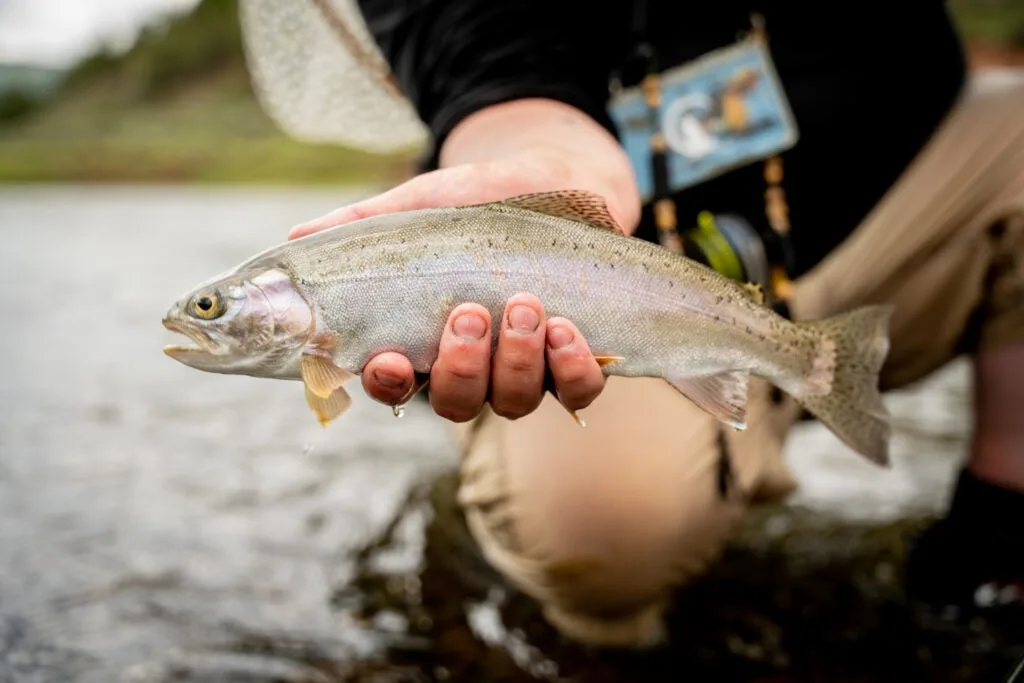
An angler shows off a nice rainbow from the Colorado River. Bradey Hall
“I didn’t really know what my purpose of being here was until the end of the weekend,” he says. “I didn’t necessarily come here for additional tools. I came here to reflect out loud with other people about where I’m at, where I need to go, and how to be accountable. Whether or not I see these guys in the future again, they’re going to be behind me.”
Dave has been on a bunch of guided fishing and hunting trips. And even though all of them usually led to moments of reflection, he said this trip was different.
“I’ve got some best friends that I love to death,” he says. “They’re my guys 100 percent. But you feel like you’re burdening them sometimes when you need to reflect or work through things. This experience was so much more intentional and steered in a direction to open those cans of worms that you otherwise wouldn’t in a regular conversation.”
Dave landed a handful of fish the day before, but today we’re both getting skunked. Yesterday, a Sparkle Pupa was the ticket. Dave and I both run double nymph rigs with leeches above small subsurface caddis patterns. Some of the retreat’s participants hooked up earlier in the morning, but I’ve yet to get a strike. At some point, my conversation with Dave turns to the ones that get away. “I’ve hunted a lot of animals and caught a lot of fish,” he says. “I honestly remember the things I didn’t catch or didn’t kill more than I do the things I did.”
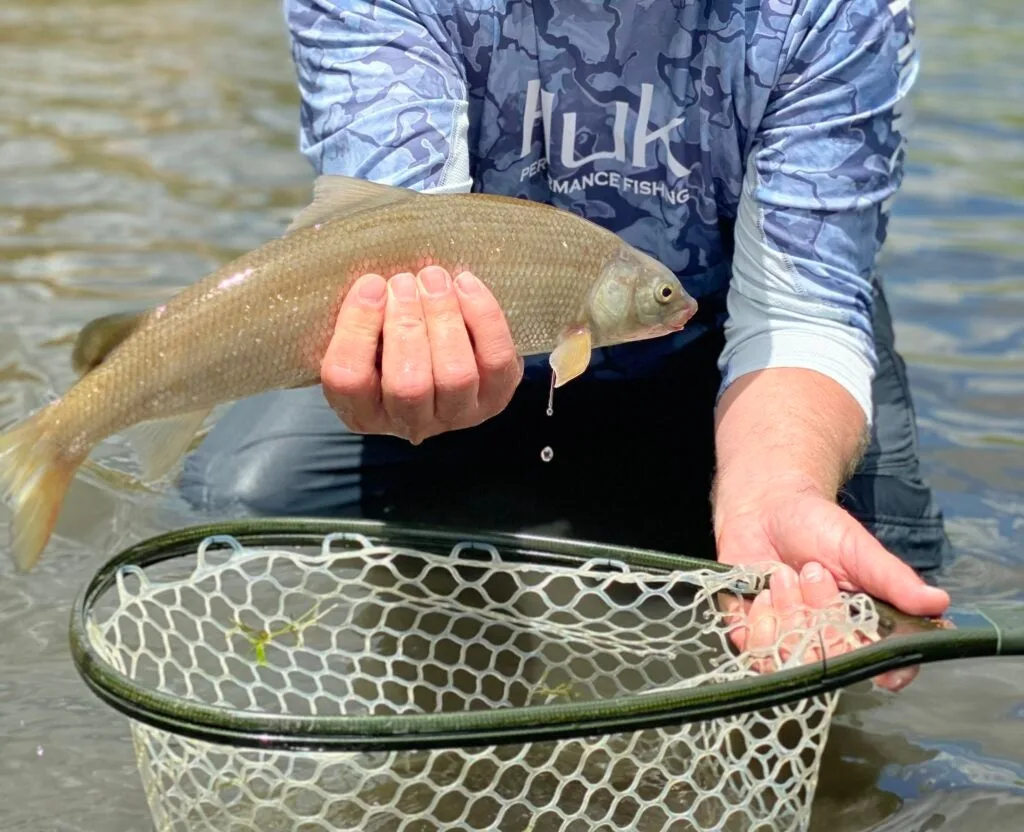
Todd, one of the retreat’s participants, landed a solid mountain whitefish on the second day. Baker Arena
After a while, I venture upstream to do some fishing on my own. I start stripping a Micro Zonker, and soon land a chunky cut-bow before hooking into a massive brown that rolls its fat golden underside to the surface and breaks off before I can get it onto the reel. Well, I think to myself, I’ll remember that one.
But what I’ll remember most from that day is watching Todd land his second-ever fish on a fly rod. It happens shortly after one of the volunteers, Baker, helps him re-rig after a trout snapped his line. Todd’s frustrated. He lost quite a few fish the same way yesterday before landing that small brown. But he smiles, shakes it off, and casts out again. When his strike indicator jags, he sets the hook and keeps the rod tip high.
Within seconds, Todd has a sizeable mountain whitefish to the net. Todd’s hands shake and his breath comes out ragged as he admires his fish.
Later in the afternoon, he plays back the catch for me: “My first thought was, ‘Here we go again. This one’s going to get away. He’s not going to make it to the net.’ I’ve set the hook on quite a few fish this weekend but was only able to reel in a smaller one. That was fun, but landing that big whitefish just grabbed my heart. It was just pure joy. It was my cast. It was me reeling it in, you know. It was me for a second. It was me.”

